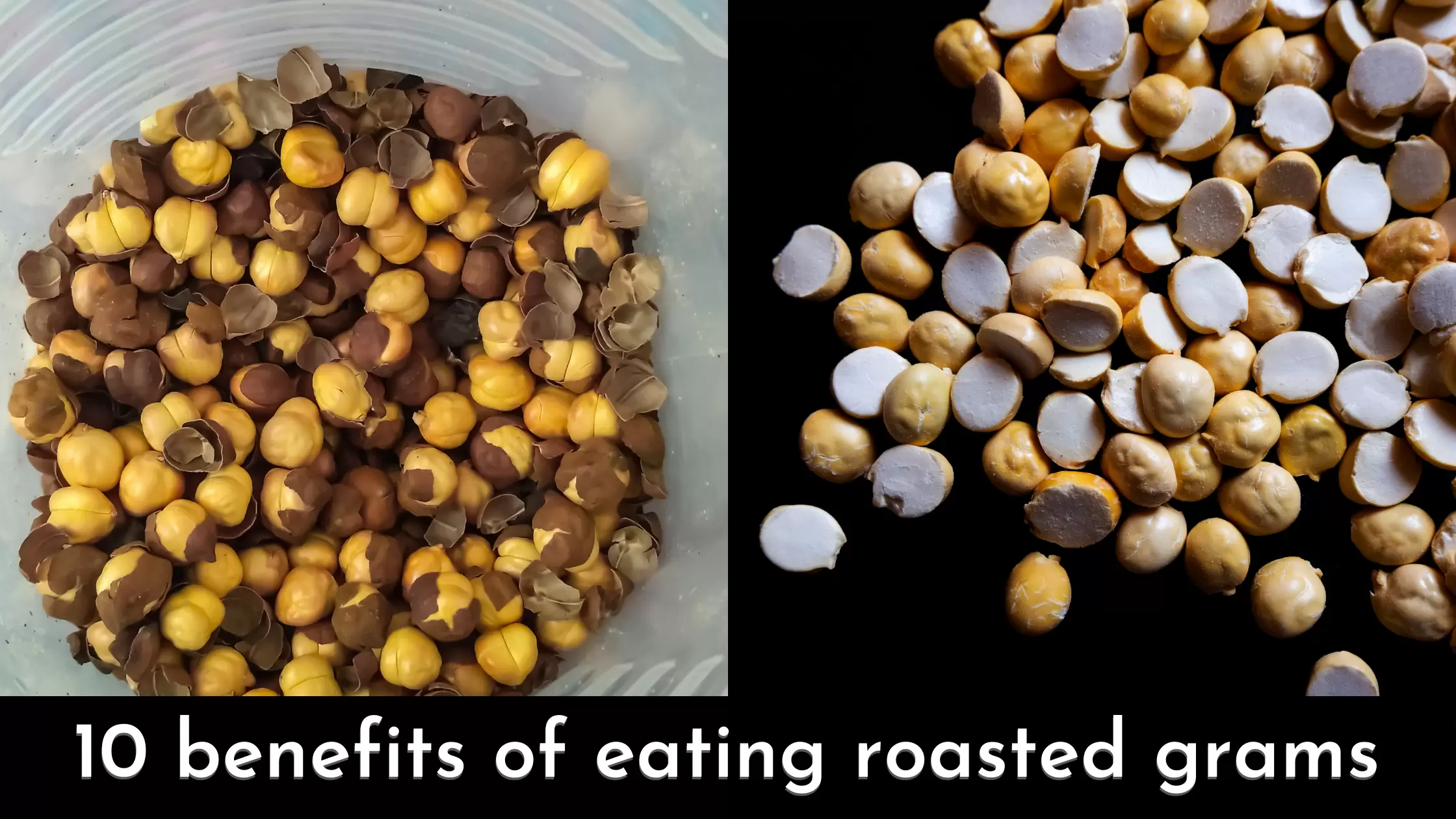Roasted gram, also known as chana or Bengal gram, is a popular snack in many parts of the world. Here are 10 potential benefits of eating roasted gram:
Rich in protein:
Roasted gram is an excellent source of protein, with about 20 grams of protein per 100 grams of roasted gram. Protein is essential for muscle growth and repair.
Roasted gram, also known as chana or chickpeas, is a popular snack and ingredient that is rich in protein. Protein is essential for building and repairing tissues in the body, making it an important nutrient to include in your diet. Roasted gram contains about 19 grams of protein per 100 grams of serving, making it an excellent option for those who follow a vegetarian or vegan diet.
In addition to being rich in protein, roasted gram also contains other important nutrients such as fiber, vitamins, and minerals. This makes it a great food to incorporate into your diet if you’re looking to improve your overall health. Fiber helps keep you feeling full for longer periods of time and can aid in digestion while vitamins and minerals provide various benefits such as boosting immunity and supporting bone health.
Overall, incorporating roasted gram into your diet can provide numerous benefits due to its high content of protein along with other essential nutrients. Whether eaten as a snack or added to meals as an ingredient, this food can help support muscle growth and repair while improving overall health.
Lowers cholesterol levels:
Roasted gram is high in fiber, which can help to lower cholesterol levels and reduce the risk of heart disease.
One of the most significant benefits of eating roasted gram is that it helps lower cholesterol levels. Roasted gram contains a high concentration of dietary fiber, which can help reduce the absorption of cholesterol in the bloodstream. This means that consuming roasted gram on a regular basis can help to prevent the buildup of plaque in your arteries and reduce your risk of heart disease.
In addition to its fiber content, roasted gram also contains plant sterols that have been shown to lower cholesterol levels. These compounds are structurally similar to cholesterol and work by blocking its absorption in the digestive system. By incorporating roasted gram into your diet, you may be able to lower your LDL or “bad” cholesterol levels while maintaining healthy HDL or “good” cholesterol levels.
If you’re concerned about high cholesterol levels or at risk for heart disease, adding roasted gram to your diet is an easy way to improve your cardiovascular health. Whether eaten as a snack or added to meals, this versatile legume offers numerous health benefits beyond its delicious taste.
Helps with digestion:
The fiber in roasted gram can also help to promote healthy digestion and prevent constipation.
Eating roasted gram is known to help with digestion. The high fiber content in this legume promotes regular bowel movements and prevents constipation. It also helps in maintaining the pH balance of the stomach by reducing acidity levels, thereby preventing digestive problems like bloating, gas, and indigestion.
Roasted gram is also a good source of digestive enzymes that facilitate the breakdown of food molecules into simpler forms for easy absorption by the body. These enzymes play an important role in maintaining a healthy gut microbiome by promoting the growth of beneficial bacteria and inhibiting harmful ones.
Furthermore, roasted gram contains prebiotics that act as food for probiotics or good bacteria present in our gut. This results in improved digestion and better nutrient absorption from food. Therefore, adding roasted gram to your diet can be an effective way to promote overall digestive health and prevent various gastrointestinal disorders.
Low glycemic index:
Roasted gram has a low glycemic index, which can help regulate blood sugar levels.
Low glycemic index (GI) foods are those that do not cause a rapid spike in blood sugar levels. Roasted gram, also known as chana dal, is one such food that has a low GI. This makes it an ideal snack for people with diabetes or those trying to manage their blood sugar levels.
Apart from being a low GI food, roasted gram has several health benefits. It is high in protein and fiber which helps keep you feeling full for longer periods of time. Additionally, it contains essential vitamins and minerals such as iron, potassium, and magnesium which aid in maintaining good health.
Roasted gram is also an excellent source of antioxidants which help protect the body against harmful free radicals. Overall, incorporating roasted gram into your diet can be beneficial for both your physical and mental well-being.
Boosts energy:
Roasted gram is a good source of complex carbohydrates, providing a steady stream of energy throughout the day.
Eating roasted gram is an excellent way to boost your energy levels. This nutrient-dense food contains a high amount of protein, fiber, and complex carbohydrates that provide sustained energy throughout the day. The presence of essential vitamins and minerals such as iron, magnesium, and folate in roasted gram aids in promoting blood circulation and reducing fatigue.
Moreover, roasted gram contains low glycemic index sugars which help regulate blood sugar levels by releasing glucose into the bloodstream slowly. This not only provides a steady source of energy but also prevents sudden spikes in insulin levels that can lead to tiredness or drowsiness after consuming sugary foods.
In conclusion, adding roasted gram to your diet is a great way to naturally boost your energy levels. Its rich nutrient profile helps promote overall health while providing sustained energy throughout the day. So next time you need a quick pick-me-up snack, grab a handful of roasted gram!
Also Read: wellhealthorganic.com:easy-way-to-gain-weight-know-how-raisins-can-help-in-weight-gain
Rich in vitamins and minerals:
Roasted gram is high in vitamins and minerals, including iron, magnesium, and vitamin B6.
Roasted gram, also known as chana or Bengal gram, is a nutrient-dense food that is high in vitamins and minerals. One of the primary benefits of roasted gram is its high protein content. It contains all essential amino acids required by the body and helps in building and repairing muscles. Additionally, roasted gram is rich in vitamins B1, B5, and B6 which are crucial for maintaining healthy skin, hair, eyesight, and liver.
Roasted gram also has an abundant supply of minerals such as iron, magnesium, phosphorous, potassium and zinc which play a vital role in various bodily functions. Iron helps to boost hemoglobin levels in the blood while magnesium aids muscle function and bone health. Potassium regulates blood pressure levels whereas phosphorous helps to maintain healthy bones and teeth.
Overall roasted gram is an excellent addition to any diet as it provides numerous health benefits due to its nutrient-rich composition. It can be consumed on its own as a snack or used in cooking for added flavor and nutrition. Its versatility makes it easy to incorporate into daily meals for those looking to improve their overall health through dietary changes.
Helps with weight management:
Roasted gram is low in fat and calories, making it a good option for those looking to manage their weight.
Another benefit of incorporating roasted gram into your diet is its ability to help with weight management. Roasted gram is a low-calorie and high-fiber food, making it an excellent choice for those looking to lose weight or maintain a healthy weight. High-fiber foods like roasted gram can help you feel full for longer periods while also promoting regular bowel movements, which helps in the digestion process.
Furthermore, roasted gram is packed with essential nutrients that promote overall health and wellbeing. The protein present in roasted gram helps build lean muscle mass, which can contribute to faster metabolism rates and improved weight management efforts. The mineral content of this legume also plays a vital role in regulating body weight by optimizing hormonal functions that regulate appetite and metabolism.
Incorporating roasted gram into your diet can be an easy and effective way to manage your weight and improve your overall health. With its low calorie count, high fiber content, and rich nutrient profile, it’s no wonder why this legume has been used as a staple food for centuries across various cultures around the world.
Improves bone health:
Roasted gram is rich in calcium, essential for strong bones.
Roasted grams are an excellent source of minerals, particularly calcium and magnesium that are essential for bone health. These minerals help in the formation and maintenance of strong bones and prevent the risk of osteoporosis, a condition where bones become weak and brittle. A single cup of roasted gram contains around 140 mg of calcium, which is about 14% of our daily requirement. It also has magnesium, which plays a vital role in regulating calcium levels in the body.
Roasted grams also contain zinc, a mineral required for maintaining bone density as it helps in collagen synthesis. Collagen is an essential protein found in bones that provides structure to them. Zinc deficiency can lead to low levels of collagen production resulting in poor bone health. Therefore, consuming roasted grams can help promote adequate zinc intake leading to stronger bones.
Overall, incorporating roasted grams into your diet can improve your bone health by providing essential nutrients like calcium, magnesium and zinc required for healthy bones.
Boosts immunity:
Roasted gram contains antioxidants, which can help to boost immunity and protect against disease.
One of the most significant benefits of eating roasted gram is that it boosts immunity. The high protein content in roasted gram helps the body to produce antibodies that fight against diseases and infections. It also contains several minerals such as calcium, iron, magnesium, and phosphorus that are essential for healthy immune function.
Roasted gram is also an excellent source of vitamin C, which helps to stimulate the production of white blood cells. These white blood cells help to protect the body against viruses and bacteria that can cause illnesses such as colds and flu. Additionally, roasted gram is rich in antioxidants that help to protect against free radicals that can damage cells.
Incorporating roasted gram into your diet is an effective way to boost your immune system’s strength naturally. Its numerous health benefits make it a great addition to any meal or snack time routine. So if you’re looking for a healthy snack option or want to add some extra nutrition to your diet, consider adding some roasted grams into your daily routine!
Easy to prepare:
Roasted gram is a convenient snack that can be eaten on its own or added to salads, soups, and other dishes.
Roasted gram or chana is a popular snack that can be enjoyed by people of all age groups. One of the main reasons why roasted gram is gaining popularity among health-conscious individuals is that it’s incredibly easy to prepare. All you need to do is roast the gram in a pan until it turns brown and crispy, and your snack is ready!
The best part about this snack is that you can make it in advance and store it for later use. Roasted gram stays fresh for weeks if stored properly in an airtight container. It makes for an excellent on-the-go snack as well, as it requires no preparation time.
Roasted gram has several health benefits, including weight loss, improved digestion, and increased energy levels. With its ease of preparation, you can incorporate roasted gram into your daily diet with minimal effort while reaping its nutritional benefits.
Conclusion
In conclusion, roasted gram offers a variety of benefits that make it an excellent addition to any diet. As previously mentioned, it is a rich source of protein and fiber which aids in weight loss and digestion. Furthermore, the high amount of antioxidants present in roasted gram helps to reduce inflammation and prevent chronic diseases such as cancer.
Another benefit of consuming roasted gram is its low glycemic index which makes it an ideal snack option for individuals with diabetes or those looking to regulate their blood sugar levels. It also contains essential vitamins and minerals like iron, magnesium, and potassium which support overall health.
Overall, incorporating roasted gram into your diet not only adds flavor but also provides numerous health benefits. It can be eaten on its own as a snack or added to salads, soups, or other dishes for an extra boost of nutrition. So why not start incorporating this superfood into your meals today?
FAQ
Q: What is a roasted gram?
A: Roasted gram, also known as chana or Bengal gram, is a legume that has been roasted and is commonly eaten as a snack.
Q: What are the nutritional benefits of roasted gram?
A: Roasted gram is a good source of protein, fiber, complex carbohydrates, vitamins (such as B6), and minerals (such as iron and magnesium).
Q: How can roasted gram help with digestion?
A: The fiber in roasted gram can help to promote healthy digestion and prevent constipation.
Q: Can roasted gram help with weight management?
A: Roasted gram is low in fat and calories, making it a good option for those looking to manage their weight.
Q: Is roasted gram good for bone health?
A: Roasted gram is rich in calcium, essential for strong bones.
Q: What are some ways to eat roasted gram?
A: Roasted gram can be eaten on its own as a snack or added to salads, soups, and other dishes.
Q: Can roasted gram help boost immunity?
A: Yes, roasted gram contains antioxidants, which can help to boost immunity and protect against disease.
Q: Is roasted gram good for regulating blood sugar levels?
A: Roasted gram has a low glycemic index, which can help regulate blood sugar levels.
Q: Can roasted gram lower cholesterol levels?
A: Yes, the fiber in roasted gram can help to lower cholesterol levels and reduce the risk of heart disease.
Q: Are there any precautions to be taken while consuming roasted gram?
A: Roasted gram is generally safe to consume, but it is recommended to consume it in moderation as excessive consumption may lead to gas and bloating in some people. Also, those with a history of kidney stones may want to limit their intake as it is high in oxalates.








